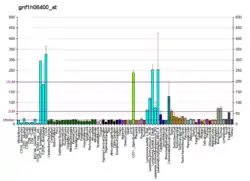CDCA5
Sororin is a protein that in humans is encoded by the CDCA5 gene.[5][6][7]
Function
Sororin is required for stable binding of cohesin to chromatin and for sister chromatid cohesion in interphase.[8]
Clinical significance
Transactivation of Sororin and its phosphorylation at Ser209 by ERK play an important role in lung cancer proliferation.[9]
References
- GRCh38: Ensembl release 89: ENSG00000146670 - Ensembl, May 2017
- GRCm38: Ensembl release 89: ENSMUSG00000024791 - Ensembl, May 2017
- "Human PubMed Reference:". National Center for Biotechnology Information, U.S. National Library of Medicine.
- "Mouse PubMed Reference:". National Center for Biotechnology Information, U.S. National Library of Medicine.
- Walker MG (Aug 2002). "Drug target discovery by gene expression analysis: cell cycle genes". Curr Cancer Drug Targets. 1 (1): 73–83. doi:10.2174/1568009013334241. PMID 12188893.
- Rankin S, Ayad NG, Kirschner MW (Apr 2005). "Sororin, a substrate of the anaphase-promoting complex, is required for sister chromatid cohesion in vertebrates". Mol Cell. 18 (2): 185–200. doi:10.1016/j.molcel.2005.03.017. PMID 15837422.
- "Entrez Gene: CDCA5 cell division cycle associated 5".
- Schmitz, J.; Watrin, E.; Lénárt, P.; Mechtler, K.; Peters, JM. (Apr 2007). "Sororin is required for stable binding of cohesin to chromatin and for sister chromatid cohesion in interphase". Curr Biol. 17 (7): 630–6. doi:10.1016/j.cub.2007.02.029. hdl:21.11116/0000-0002-101C-D. PMID 17349791. S2CID 11988060.
- Nguyen, MH.; Koinuma, J.; Ueda, K.; Ito, T.; Tsuchiya, E.; Nakamura, Y.; Daigo, Y. (Jul 2010). "Phosphorylation and activation of cell division cycle associated 5 by mitogen-activated protein kinase play a crucial role in human lung carcinogenesis". Cancer Res. 70 (13): 5337–47. doi:10.1158/0008-5472.CAN-09-4372. PMID 20551060.
External links
- Human CDCA5 genome location and CDCA5 gene details page in the UCSC Genome Browser.
Further reading
- Strausberg RL, Feingold EA, Grouse LH, et al. (2003). "Generation and initial analysis of more than 15,000 full-length human and mouse cDNA sequences". Proc. Natl. Acad. Sci. U.S.A. 99 (26): 16899–903. doi:10.1073/pnas.242603899. PMC 139241. PMID 12477932.
- Ota T, Suzuki Y, Nishikawa T, et al. (2004). "Complete sequencing and characterization of 21,243 full-length human cDNAs". Nat. Genet. 36 (1): 40–5. doi:10.1038/ng1285. PMID 14702039.
- Gerhard DS, Wagner L, Feingold EA, et al. (2004). "The status, quality, and expansion of the NIH full-length cDNA project: the Mammalian Gene Collection (MGC)". Genome Res. 14 (10B): 2121–7. doi:10.1101/gr.2596504. PMC 528928. PMID 15489334.
- Beausoleil SA, Villén J, Gerber SA, et al. (2006). "A probability-based approach for high-throughput protein phosphorylation analysis and site localization". Nat. Biotechnol. 24 (10): 1285–92. doi:10.1038/nbt1240. PMID 16964243. S2CID 14294292.
- Olsen JV, Blagoev B, Gnad F, et al. (2006). "Global, in vivo, and site-specific phosphorylation dynamics in signaling networks". Cell. 127 (3): 635–48. doi:10.1016/j.cell.2006.09.026. PMID 17081983. S2CID 7827573.
- Schmitz J, Watrin E, Lénárt P, et al. (2007). "Sororin is required for stable binding of cohesin to chromatin and for sister chromatid cohesion in interphase". Curr. Biol. 17 (7): 630–6. doi:10.1016/j.cub.2007.02.029. hdl:21.11116/0000-0002-101C-D. PMID 17349791. S2CID 11988060.
- Díaz-Martínez LA, Giménez-Abián JF, Clarke DJ (2007). "Regulation of centromeric cohesion by sororin independently of the APC/C". Cell Cycle. 6 (6): 714–24. doi:10.4161/cc.6.6.3935. PMID 17361102.
This article is issued from Wikipedia. The text is licensed under Creative Commons - Attribution - Sharealike. Additional terms may apply for the media files.




